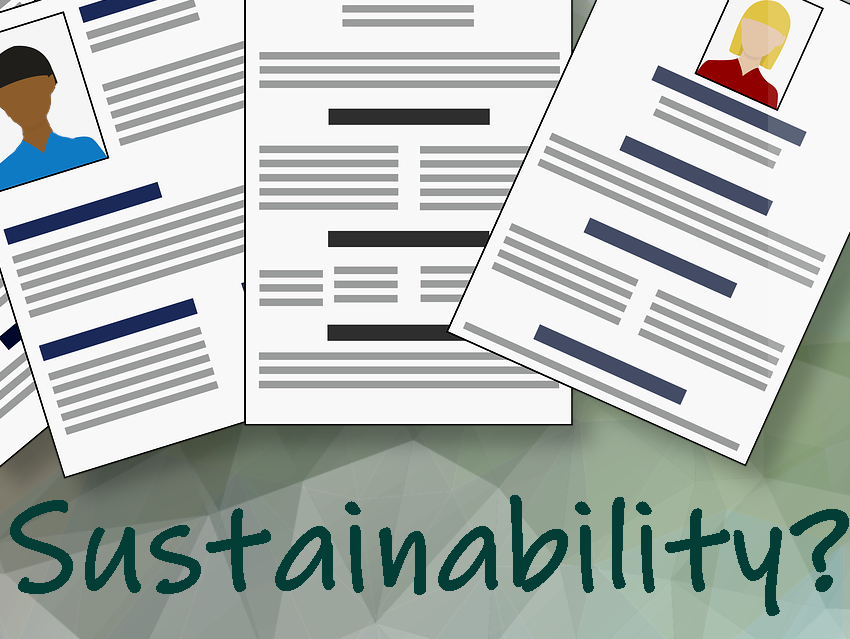The job market is constantly demanding new skills. Sustainability is a major societal issue, but does it have an impact on the desired skill profile of candidates? And how can candidates demonstrate such competencies, especially if their own research has little direct relevance for sustainability?
1 Companies Obliged to Report Sustainability Impact
On the 1st of January 2024, the Corporate Sustainability Reporting Directive (CSRD) came into effect in the European Union. It requires companies to report on the impact of their activities on the environment and society, and requires verification (assurance) of the reported information. So starting with larger companies and continuing towards smaller entities, parts of the private sector will have to show how they perform on their path to a sustainable future. The CSRD is just one of several examples of endeavors toward sustainability in our work environments.
Will they affect us as co-workers and applicants? Is experience in the broad field of sustainability an essential career skill of the future, be it that you worked on a sustainability-related topic, found ways to improve the sustainability of your work, or joined an environmental group?
2 How Does This Affect Employees And Applicants?
2.1 In Academia
Let’s begin with academia. In the past months, we have had the privilege of coaching a number of group leaders who were getting ready to apply for their first major grant. Most of their research topics are relevant to sustainability: How will we heat our buildings, move from A to B, or grow our food? Funding bodies have given due weight to green topics, making it attractive for researchers to steer their work in that direction.
“Your research outline is fantastic”, I congratulated Joanna, who had just showed me the presentation she will use during her interview with the funding body. “What’s in it for undergrads?” I ask her, simulating a question that might come her way during the interview. She looks at me, a bit puzzled. “What I do is strongly rooted in surface chemistry and mechanical engineering. So, I think that I can teach these subjects well.”
She’s undoubtedly right about that, but in the following discussion, we find many more benefits that her future students will have from working with her as their professor. They will be able to look beyond just how a system works. They will be able to judge whether the required materials can be sourced in the future, how the system can be optimized according to sustainability criteria like greenhouse gas emissions, and anticipate whether adverse social effects like child labor might be involved in the supply chain.
Researchers’ own behavior concerning sustainability is not much of a selection criterion yet, but it indirectly affects their market value. For example, an increasing number of rules exist to discourage the extensive use of flights. Researchers who can show that they network effectively without flying too much will certainly have an advantage once these policies get more teeth.
The way that research is conducted will also receive increased attention in the future. Saving energy and other resources always makes sense, a skill that will increase in value with every energy and supply-chain crisis we face. Additionally, sustainability reporting standards for universities will undoubtedly tighten in the future, making it more attractive to hire researchers who can get more done with fewer resources.
2.2 In Industry
How do sustainable research experiences and credentials play out in industry?
Undoubtedly, research topics in industry have changed to prioritize sustainability. If you worked on green chemistry, renewable energy sources, or similar topics during your Ph.D., your market value increases in line with the trending of these hot topics. The chances are increasing that job interviews cover sustainability topics. Suppose you’re asked to develop an idea to solve a problem in an assessment center. In that case, such an open-ended task might well be designed to check whether you also think about sustainability.
Your research topic is only one of several ways to show your value in a sustainability-minded environment. Did you develop ideas on how your work can be done sustainably, like identifying wasteful process steps and replacing them with sustainable ones? For chemistry labs, using non-halogenated solvents or even water, crystallization instead of chromatography processes for purification, intelligent scheduling, and instrument sharing come to mind.
3 Getting the Message Across
Lastly, experiences with sustainable topics are also a matter of communication. In academia, researchers talk about the science behind their projects: why things work, the molecular basis for macroscopic observations, and how we can tweak a system to optimize it. Transitioning into the private sector, researchers need to learn a new language, the language of business. Here, they still communicate about science, but they need to add the ability to talk about the value of their work and themselves in terms of revenue and customer benefit.
When sustainability is a consideration in their organization, be it academia or industry, they need to take on another perspective on top of the perspectives of science and business. They need to be able to talk about the long-term stability of an entire process and its impact on climate, biodiversity, and social aspects. They need to be able to communicate with an even greater variety of stakeholders from the wider society and adapt their message accordingly. Such communication skills can be sharpened outside the lab, for example, when joining an environmental group in addition to your studies or speaking with your concerned neighbor.
4 Personal Rewards
Idealism is not the only reason to engage in sustainable practices. It can also be a hard-nosed career choice to upgrade one’s market value, learning to think scientifically, economically, and sustainably.
Authors
Dr. Karin Bodewits and Dr. Philipp Gramlich founded NaturalScience.Careers, Oosterbeek, The Netherlands, a global provider of workshops and lectures on soft skills for Ph.D. students, postdocs, and group leaders. They focus on increasing effectiveness and employability by addressing aspects beyond laboratory training.




